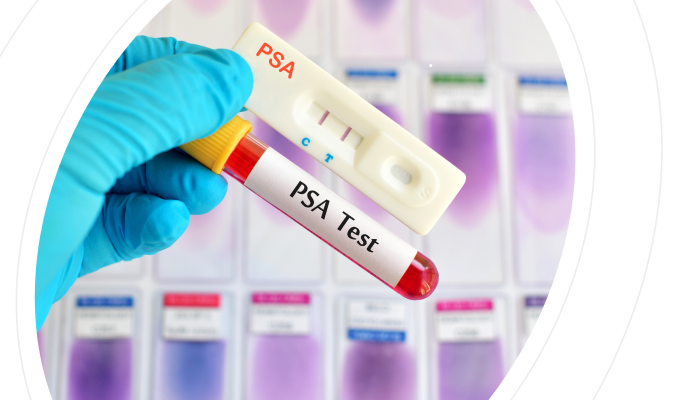Prostate Specific Antigen (PSA)
Prostate Specific Antigen is a protein produced by the cells of the prostate gland. It plays a crucial role in men’s health, particularly in the detection and monitoring of prostate conditions. Understanding PSA and its significance is essential for men of all ages, especially as they age and become more susceptible to prostate-related issues.
What Is Prostate Specific Antigen?
Prostate Specific Antigen also known as PSA is a protein produced by normal and abnormal cells in the prostate gland. It is primarily found in semen, but small amounts can also be detected in the blood. Its main function is to liquefy semen, aiding sperm motility. However, elevated levels of PSA can indicate potential prostate health issues.

Symptoms Of Elevated PSA Levels In Your Body
| Indication | PSA Levels |
|---|---|
| Safe to permissible limits | 0-2.5 ng/ml |
| Reasonably safe | 2.6-4 ng/ml |
| Suspicious | 4-10 ng/ml |
| Dangerous | >10 ng/ml |
| Optimal and abnormal PSA Levels based on age | ||
|---|---|---|
| Mens age range | Optimal PSA levels | Abnormal PSA levels |
| Ages 40-59 | 0.6 to 0.7 ng/ml | ≥ 2.5 ng/ml |
| Ages 60+ | 1.0 to 1.5 ng/ml | ≥ 4.0 ng/ml |
PSA Velocity :
Changes in PSA levels over time, known as PSA velocity, may also provide valuable information. A rapid increase in PSA levels over successive tests may raise suspicion for prostate cancer.
Age & PSA Levels :
PSA levels tend to increase naturally with age, so what is considered normal may vary by age group. Younger men typically have lower baseline PSA levels compared to older men.
| Type | Units | Interpretation |
|---|---|---|
| Total PSA1 | >2.5 ng/ml | Unlikely of prostate cancer |
| Total PSA2 | 2.5 to 10 ng/ml | Probable prostate cancer |
| Total PSA3 | <10 ng/ml | Most likely |
| Total PSA4 | <25% of total PSA | Normal Range |
Conclusion
The PSA (Prostate-Specific Antigen) test is a valuable tool for assessing prostate health and detecting potential abnormalities, including prostate cancer. While it provides essential insights, its interpretation requires consideration of various factors, and decisions regarding testing should be made through informed discussions with healthcare providers. Routine PSA screening is generally recommended for men aged 50 and older, with earlier screening suggested for high-risk populations, such as African American men or those with a family history of prostate cancer. However, the decision to undergo PSA testing should be made through informed discussions between individuals and their healthcare providers, weighing the potential benefits, risks, and limitations of screening, combined with a healthy lifestyle and proactive healthcare management, is essential for maintaining optimal prostate health <link> on www.flebo.in . Remember, early detection and proactive management are key to maintaining optimal prostate health and overall well-being.
Book a Prostate-Specific Antigen Test in Vijayapura for ONLY ₹*
